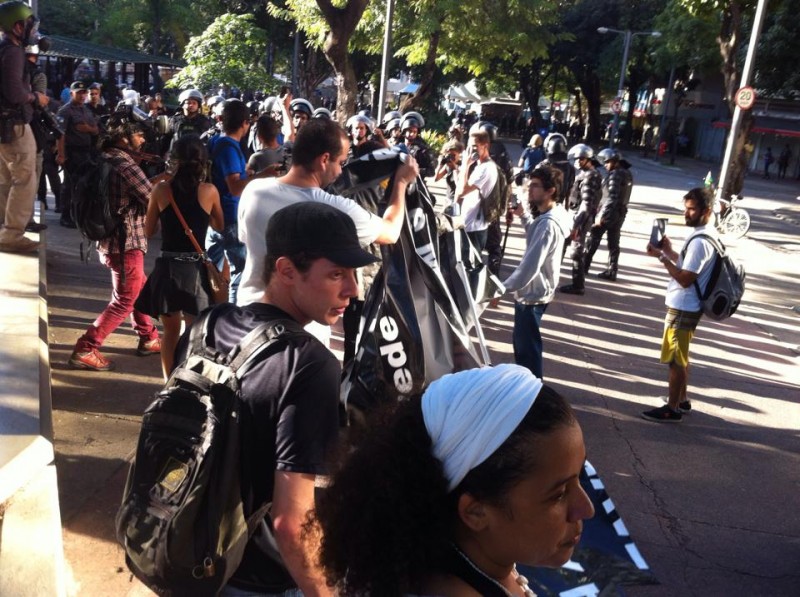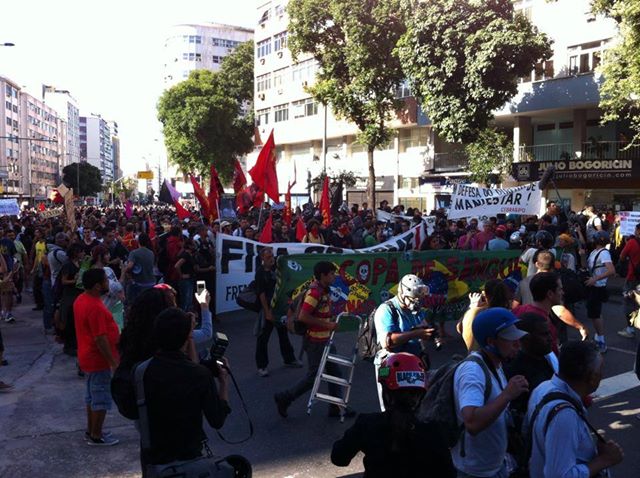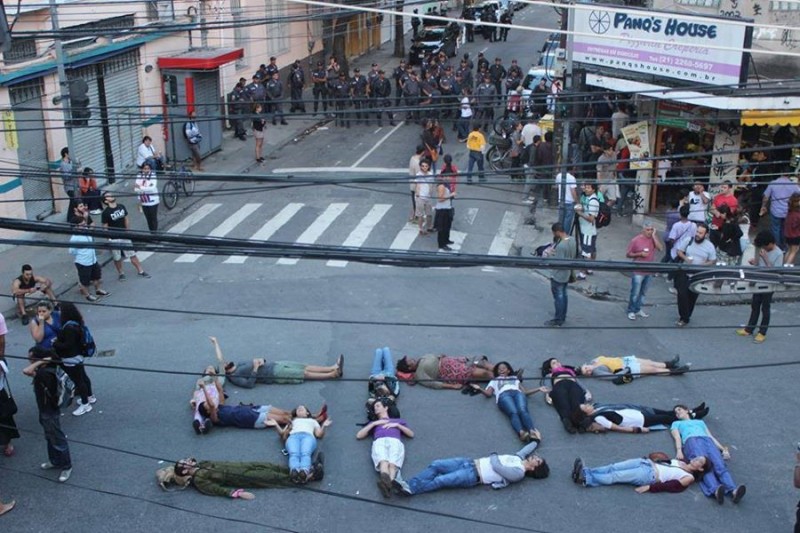The “preventative” arrests of activists against the World Cup on the eve of the final match between Germany and Argentina to stop demonstrations during the tournament's close did not succeed in discouraging Brazilians from protesting in Rio de Janeiro.
One rally gathered hundreds of people, who oppose the lavish spending on the mega-event. As activists have come to expect, the protest was met with tear gas bombs, stun grenades and baton-wielding police officers.
Protesters were unable to walk to the Maracana stadium, where the final match was played, because of police cordons blocking off the area. Attempts to break the blockade was rebuffed aggressively. Even the cavalry, with police officers armed with swords, were used against protesters.
Activists and journalists said they were kicked by the military police, manhandled and beaten. Canadian filmmaker Jason O'Hara was kicked in the head by a passing officer and his GoPro camera that was attached to his helmet was stolen, the alternative newspaper A nova democracia (The New Democracy) reported. The newspaper recorded the assault, and the video is available on YouTube.
Another activist was kicked by military police officer Rogério Costa de Oliveira, who has been accused by social movements of assaulting women in demonstrations in the past, and the moment was captured on film by YouTube user Tandy Firmino:
According to the Union of Journalists of Rio de Janeiro, at least 15 journalists were assaulted during protest by the military police.
The collective Midia Ninja listed others who were injured:
O jornalista Felipe Peçanha, Mídia Ninja, foi cercado por 8 policiais, teve sua lente quebrada e sofreu agressões enquanto transmitia os cuidados médicos ao Jason O'hara.
A documentarista Aloyana Lemos, MIC, foi detida enquanto registrava as agressões à manifestantes no ato até então pacífico na praça Saens Peña, Tijuca. Aloyana está sendo encaminhada para a 21º DP.
O fotógrafo Bernardo Guerreiro, Mídia Ninja, teve sua lente quebrada e foi agredido com spray de pimenta no olho de curta distância.
Journalist Felipe Peçanha, Midia Ninja, was surrounded by eight policemen, had his camera lens broken and was assaulted while filming Jason O'Hara's ordeal as he was being helped by doctors.
Filmmaker Aloyana Lemos, MIC, was arrested while recording the assaults on protesters who were at that moment demonstrating peacefully at the Saens Peña square, Tijuca. Aloyana was sent to police department 21.
Photographer Bernardo Guerreiro, Midia Ninja, had his camera lens broken and was assaulted with pepper spray in the eye from a short distance.
In some situations, police blocked protesters and reporters from leaving the area. Journalist Tamara Cardoso summarized the situation:
estou sendo mantida refém pela polícia.
Identificada como jornalista, dentro de um carro identificado como um carro de reportagem, não posso sair da praça Saens Pena.
Ta bom ou precisa mais?
I'm being held hostage by the police.
Identified as a journalist, in a car identified as a reporter car, I cannot leave the Saens Pena square.
That's enough or do you need more?
The Rede de Comunidades e Movimentos Contra a Violência (Network of Communities and Movements against Violence) posted a photo by journalist Camila Nobrega from the NGO Ibase of protesters using their bodies to spell out “SOS”:
“SOS”. É a mensagem que pessoas encurraladas pela polícia nas imediações do Maracanã acabam de escrever no chão da rua Desembargador Isidro, na Tijuca: um pedido de socorro. Após reprimir de forma truculenta a manifestação que ocorria no entorno da Praça Saens Pena, a Polícia Militar fez um cerco em todas as ruas do local, impedindo a circulação. Cerca de mil pessoas estão “presas” nas ruas da Tijuca, cercadas de policiais.
“SOS”. Its the message that people trapped by police in the vicinity of Maracanã just spelled out at the Desembargador Isidro Street in [the neighborhood of] Tijuca: a distress call. After aggressively suppressing the protest that occurred in the vicinity of the Saens Pena square, military police laid siege to every street their, preventing movement. About a thousand people are “stuck” in the streets of Tijuca, surrounded by police.
Engineer Maurício dos Santos posted a series of photos of the scene and commented on Facebook:
PM fecha metrô, joga bombas, destrói faixas e cartazes, espanca pessoas e transforma a Praça Saens Peña em praça de guerra. Nessa praça jaz a democracia.
The military police close the subway, throw bombs, destroy banners and posters, beat up people and transform Saens Peña Square into a war zone. In this square lies democracy.
At least seven people were arrested, including a minor, the Collective Mariachi reported on Facebook. Activist Paula Kossatz and Anna Baptista Marim posted videos on Facebook of moments when police lashed out at protesters seemingly without provocation.
Baptista Marim described what she filmed:
PM ataca passageiros no metrô.
Minutos antes deu apanhar:
Durante muitas bombas, prisões e porradarias de PMs com cacetete na praça Saens Pena, eu e meu marido fomos os últimos a conseguir entrar na estação cheia de gás.
Ficamos filmando a caça da polícia que tentava identificar quem era manifestante e quem não era.
Nosso grande crime, merecedor de muita porrada, foi ter ficado filmando a ação da PM. Por isso que é dificil encontar vídeos denunciando a covardia da policia.
The military police attacks passengers on the subway.
Minutes before I was beaten:
Throughout many bombs, arrests and beatings from police with batons at the Saens Pena Square, my husband and I were the last to get into the crowded gas station.
We were filming the police try to identify who was and who was not a demonstrator.
Our greatest crime, none which deserved that much beating, was to have been filming the police's actions. That's why is difficult to find videos denouncing the cowardice of the police.
While the Germans were celebrating their win against Argentina in the Maracana stadium, police and protesters were clashing outside in a scene all too familiar since last year's Confederations Cup. Cartoonist André Dahmer, author of comics Malvados (Evil) characterized what will happen to people who protest nowadays in Brazil: “I wanted to demonstrate my sorrow for the Argentina national team, but whoever demonstrates gets arrested.”









